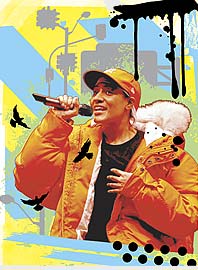
No form of theater scares me more than the solo play. The dread you feel upon noticing that your seatmate on the red-eye looks both talkative and dull is the dread I experience every time I open a Playbill, look at the cast page, and see only one face looking back. Solo plays have proliferated lately, in woeful disregard of the fact that almost no actors have the talent and charisma to hold our interest for two hours by themselves.
I nurture my aversion despite some compelling evidence to the contrary, from Jefferson Mays’s epochal shape-shifting in I Am My Own Wife to Jack Holmes’s inspiring turn in the still-running RFK. And now I have to concede that in Bridge & Tunnel, Sarah Jones is onto something.
The one-person play often exists to celebrate difference—specifically, how many different characters an actor can portray—and Jones is admirably adept. She sets her play at a poetry reading at the Bridge & Tunnel Café in “beautiful South Queens,” where all sorts of immigrants have met to share their verse. The host, Mohammed Ali, is a Republican from Pakistan. There’s also a Mexican who lost his girlfriend while crossing the border, a quick-talking rapper, a taciturn Russian, and so on.
Jones swaps accents and accessories to suit each character, but the real change is physical. Even when a Jordanian woman’s accent wanders into Belfast, or an Australian begins to sound like no human I’ve ever encountered, the actress is remarkably convincing at changing her body, from her posture to her pupils. Her fine transformations are just as evident on Broadway as they were during the show’s more intimate downtown run, and just as impressive. To play a sixth-grader from the Bronx, she appears to grow dimples.
Jones’s dexterity is rare, but what ultimately separates her play from the genre isn’t the way it seeks out differences; it’s the way she celebrates similarities. Reconciliation is her theme, the search by many different people for happiness and security among many other different people. Jones notes that the struggle has been going on for generations in America, and continues to unfold within individual families as well. (A highlight is a Chinese woman who describes her struggle to accept her gay daughter.)
This is where the show’s solo nature proves so crucial to its appeal. Watching Jones demands a kind of triple vision: We’re aware of her as a performer, the character she’s playing, and, most important, all the other characters that have come before. By allowing so much difference to share the same space—the same body—she comes to personify her theme of peaceful coexistence. Many solo plays demonstrate that we all contain Whitmanesque multitudes; Jones makes the point national, evoking, in her writing and acting, the principle of the melting pot.
That may sound pretty earnest, and the evening does contain a few such moments—for instance, a whiff of Up With People in the closing poet’s tribute to every immigrant group under the sun. But again and again, Jones wins you over with spiky humor. A bubbe from Long Island calls America “the best country in the world” because we can decide what happens here, and even “decide what happens in other people’s countries” too. Somebody else announces that the Pilgrims were “the first illegal aliens.”
Even the sharpest humor can get wearying, and Jones, who wastes no movements as a performer, sometimes lacks concision as a writer. Still, she has acquitted herself well enough in both departments that I hope her show sticks around. For here is the final way in which Jones does credit to the solo genre: As long as Bridge & Tunnel runs, Broadway will feature at least one play written by, and one play starring, a young black woman—and a show that draws a young, diverse crowd. One of her characters calls America “this colorful nation”; it’s past time Broadway started looking that way too, even if it means moving one solo at a time.
Bridge & Tunnel. Written and performed by Sarah Jones. Helen Hayes Theatre. Through march 12.